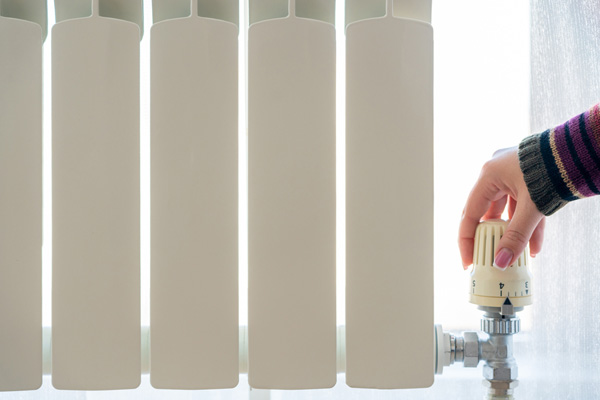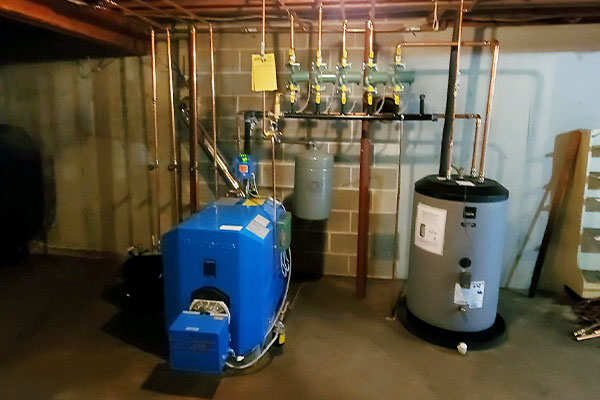Contents
Heating solutions play a pivotal role in ensuring home comfort, especially during the chillier months. Hydronic heating systems emerge at the forefront as the quest for efficient heating methods gains momentum. This article discusses heating oil systems in depth, spotlighting these systems’ vital role in creating inviting interiors. Moreover, we’ll talk about hydronic heating, particularly emphasizing the hot water radiator. We will explore how they work, their advantages, and the innovative edge they bring to contemporary homes.
Understanding The Hot Water Radiator
At its core, a hydronic heating system, often referred to as a hot-water heating system, uses water to transmit heat and warm homes and offices. The process begins with a central boiler heating the water, which is then directed through a network of pipes and radiators that disperse the warmth.
The concept of radiators is not new; they began in the 19th century when steam radiators were the talk of the town. However, as time progressed, hot-water radiators carved their niche, lauded for enhanced control and heating efficiency.
These nifty heating devices, usually crafted from cast iron, steel, or aluminum, are equipped with a sequence of tubes or fins that contain the heated water. As the water moves through the radiator, it releases its stored warmth. Consequently, the surrounding air heats up, and cold air is sucked in, establishing a continuous loop of rising warm air and circulating cool air, ensuring a uniformly warm environment.
Related Article: Boiler Vs. Furnace: What Are Their Differences?
The Mechanics of a Hot Water Radiator
The Process

Harnessing the dual powers of convection and radiant heat transfer, hot-water radiators function simply and effectively. Warm water from the main boiler courses through pipes, reaching the radiators and dispersing warmth into rooms. Once cooled, the water returns to the boiler, preparing for another heating cycle.
Related Article: How Does Sludge Form In A Heating Oil Tank?
Understanding Heat Dynamics
The radiator’s internal warm water heats its metallic exterior, releasing warmth into the room’s atmosphere. This heat causes air to ascend, resulting in a cyclical flow of warming air.
Heating Oil’s Contribution to Hydronic Systems

Heating oil is a popular fuel to warm the water in boilers. This heated water then journeys through the radiators, infusing the space with warmth. The combustion efficiency of heating oil directly correlates to the system’s overall performance and energy optimization.
Related Article: How Do I Connect My Smart Oil Gauge To Alexa?
Powering Your Hydronic System with Heating Oil
Heating oil, sometimes called fuel oil, is derived from crude oil. It is a frequently chosen energy source for hydronic heating systems due to its consistency and efficiency. Stored in dedicated tanks, it’s transported to the boiler, ready for combustion.
Within the hydronic framework, the heating oil undergoes combustion in the boiler, producing intense heat. This heat is then relayed to a heat exchanger, which warms the water circulating throughout the system. The heated water travels via pipes to the radiators, disseminating warmth throughout the desired spaces.
As radiators emit this heat, the water inside loses its warmth, becoming cooler and more compact. This cooled water reroutes to the boiler, ready for reheating. A dedicated pump propels this water, ensuring a steady flow from the boiler to the radiator and back, guaranteeing uniform warmth.
To sum it up, the ignition of heating oil creates a domino effect, ultimately resulting in the warm water radiating heat via hydronic system radiators.
Perks of Leveraging Heating Oil in Hydronic Systems
Here are some standout benefits of opting for oil-powered radiant heating:
- Maximized Energy Utilization: Oil-powered radiators emphasize energy conservation, efficiently converting energy from the combustion process into heat, thus reducing energy loss.
- Cost Benefits: Oil radiators may prove more wallet-friendly, especially in areas where heating oil costs remain competitive. Factors like efficient heat dissemination and zonal heat management enhance these savings.
- Uniform & Welcoming Warmth: Hydronic systems powered by oil radiators can deliver a steady and enveloping warmth. The radiant heat emitted warms the air, surfaces, and objects, creating a genuinely inviting ambiance.
- Eco-conscious Heating: Recent breakthroughs in heating oil formulations have resulted in cleaner combustion variants with diminished emissions. It’s pivotal to factor in the environmental repercussions, with modern-day oil heating systems taking strides towards lessening their ecological impact.
Related Article: The Importance Of Regular Heating Oil Filter Replacements
Upkeep and Problem-solving for Oil-Powered Hydronic Systems
Routine Care for Hot Water Radiators
- Routine Checks: Regularly assess radiators for potential leaks, wear, corrosion, or any damaged sections. Timely attention to these can ensure seamless heat distribution.
- Air Release: Occasionally let out trapped air from radiators. This helps in maintaining consistent water flow and avoids uneven heating.
- Regular Cleansing: Eliminate any accumulated dust or debris to enhance the radiator’s heat output.
Guide for Addressing Common Heating Oil System Issues
- Absence of Heat: Review the thermostat’s calibration. Confirm if the boiler is operational and ensure the tank has an adequate oil supply.
- Subpar Heating: Cross-check the thermostat’s configuration. Ensure that radiators are devoid of trapped air. A boiler tune-up might be in order.
- Fluid Leakage: Survey the system for evident leaks and attend to them without delay, mitigating further complications.
- Audible Disturbances: Unusual sounds could hint at trapped air or other potential problems. Releasing air from radiators might help, but if issues persist, seek expert intervention.
Related Article: 10 Ways to Save Money on Heating Oil Costs
Final Thoughts
Hydronic systems powered by heating oil epitomize the harmonious blend of innovation and scientific principles, bringing unrivaled warmth. Their prowess in even temperature distribution, energy conservation, and financial prudence makes them ideal for snug interiors. Adequate upkeep of these radiators ensures consistent heat and paves the way for a homely and environmentally-conscious house.
Related Article: Top 10 Boiler Problems Homeowners Experience
Call Tevis Energy For Your Home Heating Oil Requirements

Tevis Energy is a trustworthy heating oil delivery company that services central Maryland and southern Pennsylvania. Our company offers affordable and the most competitive heating oil prices in the area. Our goal is to provide you with excellent products and services. When you choose us to be your oil supplier, you can rest easy knowing that you will have correct and prompt heating oil deliveries at the best possible prices. Furthermore, we offer various heating oil delivery plans and financing options as a way to customize your oil deliveries. Be sure to call us today to learn more.
Tevis Energy has certified and highly trained HVAC technicians to cater to all your heating and cooling needs. We guarantee that each of our techs has the experience, skills, and knowledge to provide excellent HVAC services. Our team can assist you with installations, repairs, maintenance, and much more. Our superior HVAC solutions always come at affordable costs, and we back all of our work with a guarantee.
Call us today to learn more about the products and services our company offers. We provide free, in-home estimates.
You can click here to contact us now or call us at (410) 876-6800 to find out more! Click the link to view our service area.
Posted in Blog
Tags: